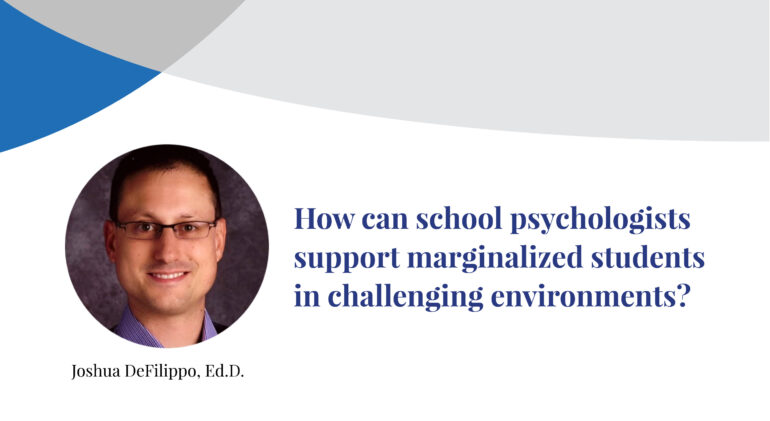Last fall, Florida commenced its first school year since the state’s legislature expanded House Bill 1557, which was passed into law in 2022, to encompass all public-school grade levels up to grade 12. The law’s intention is to eradicate any acknowledgment or discussion of LGBTQ+ persons in public schools.
Since its enactment in July 2022, stigmatic consequences have already adversely affected numerous aspects for LGBTQ+ students, including access to educational resources and support. For instance, due to concerns about potential litigation, school board members in Miami-Dade County overwhelmingly voted against a measure that would have designated October as LGBTQ+ History Month (Civil Rights Litigation Clearinghouse, 2022).
While the law stipulates liability solely for school districts, school officials are inclined to regulate the conduct of anyone associated with the school system to avert litigation. This reluctance potentially dissuades teachers, and mental health providers like social workers and school psychologist, from even having a conversation with, let alone serving as faculty advisors to Gay-Straight Alliances out of fear of disciplinary action.
Unfortunately, this situation is not isolated, as nearly 240 anti-LGBTQ+ bills were filed across the country (Lavietes & Ramos, 2022). Similarly, this academic year marked the first since Florida House Bill 7 was ratified, seeking to expunge race education and censor African American history, even rejecting an Advanced Placement-level African American studies course in high school.
The Florida Department of Education introduced a new curriculum that has drawn criticism for its historical inaccuracies and offensive content, including the assertion that “instruction includes how slaves developed skills which, in some instances, could be applied for their personal benefit” (Florida’s State Academic Standards-Social Studies, 2023). Although dismissed by the U.S. District Court for the Northern District of Florida due to limited concrete evidence of stigmatic harm and injury (Civil Rights Litigation Clearinghouse, 2022), valid concerns persist that these new laws may foster discriminatory litigation, harassment, and bullying of already marginalized groups.
As school psychologists, it is our duty not only to advocate for social justice but also to support programs that cultivate critical thinking. Both House Bill 1557 and 7 pose dangers, particularly in a field that challenges existing ideologies, as they stifle provocative ideas that confront the status quo. Ultimately, such policies can have a detrimental impact on mental health and access to care due to their direct effects and the increasing rejection experienced from communities and families.
For example, LGBTQ+ youth are more than four times likelier to attempt suicide than their peers, leading to an estimated 1.8 million LGBTQ+ youth seriously considering suicide annually in the U.S., with at least one attempting suicide every 45 seconds (The Trevor Project, 2021). However, research suggests that they are up to 40% less likely to report a suicide attempt if they report having at least one accepting adult in their life (The Trevor Project, 2019).
Regrettably, racist and homophobic policies are not new but have been a harsh reality for marginalized groups for an extended period. As behavioral health providers, we are obliged to offer affirming services, even in environments hostile to targeted groups.
So, as psychologists, how can we provide services in anti-LGBTQ+ and racist climates?
- Explore avenues to receive private training in providing services to marginalized groups and stay updated about best practices. For example, the Center of Excellence offers free opportunities and e-learning for mental health providers for this very purpose. Faith in Florida also provides an online toolkit that aids in better understanding of African American history and the genuine experiences of African Americans. Professional associations’ annual conferences may also feature workshops and continuing education on this subject.
- Ensure you cultivate an environment or office space that conveys safety. It may be challenging to have messaging and images that are affirming or accepting. If your institution prohibits displaying a safe space sticker outside your office, you can still list your own pronouns next to your name and use gender-neutral language when conversing. People often seek out support based on clues that indicate you are competent and affirming. When providing resources for programs, local support groups, or even individual services, consider using QR codes that allow individuals to take a survey, which then directs them to local programs and resources relevant to their responses.
- Next, rehearse your responses to anticipated retaliation and discriminatory comments. This will instill a sense of confidence when addressing opposition. Finally, the National Association of School Psychologists (NASP) has developed and identified resources to assist schools and families in engaging in constructive dialogue and action regarding social justice, cultural competence, and disproportionality that impacts children’s learning and well-being, all of which can be found on their website.
In these challenging times, it is imperative that we stand firm in our commitment to inclusivity, equality, and the mental well-being of all students, regardless of their background or identity.
Joshua DeFilippo, Ed.D., ABSNP, serves as a professor for the Ed.S. and Psy.D. School Psychology Programs at The Chicago School. Dr. DeFilippo is an alumnus and received his doctoral degree in school psychology from The Chicago School with an emphasis in school neuropsychology. For over a decade, Dr. DeFilippo served in public, charter, and public-school settings as a practicing school psychologist. While working in schools, Dr. DeFilippo was a site supervisor for beginning, intermediate, and advanced practicum students. Dr. DeFilippo is also a diplomat for the American Board of School Neuropsychology. He started as an adjunct professor in 2016 teaching statistics, psychometrics, educational and behavioral assessments, school-based intervention, and biological and cognitive bases of behavior before joining the core faulty in 2023. His current research and consultation interests are in trauma-informed approaches to students in crisis, utilizing data analytics in schools, and integrating neuropsychological assessment within the Multi-Tiered System of Supports (MTSS).

